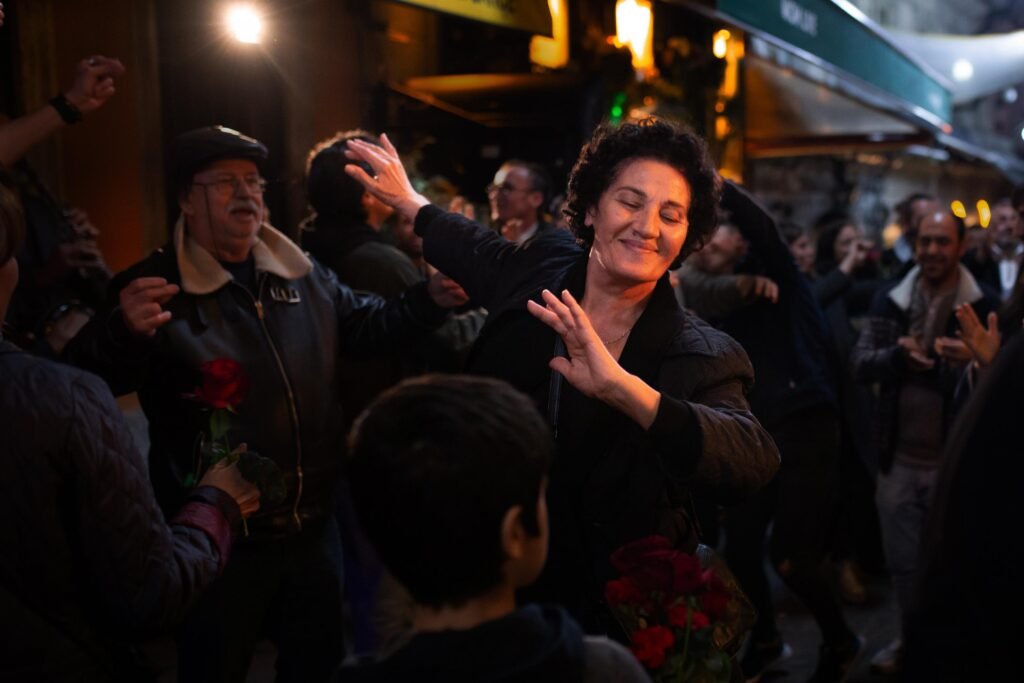Crossing Review

Just after the success of LGBT drama ‘And Then We Danced’, director Levan Akin casts Mzia Arabuli as a stoic Georgian schoolteacher searching for the trans niece she rejected years ago.
When you go to Istanbul, you can’t help but notice all the cats. The Turkish metropolis is full of them some beautiful and friendly, others ragged and standoffish and there have been entire films made about this phenomenon (“Kedi” being a particularly beloved example). But what about all the other creatures who live on the margins of this modern city? They’re invisible, until they’re not. But if you look closer, it’s hard to unsee those forgotten humans: homeless children and street vendors, sex workers and immigrants, many of them struggling to survive.
Levan Akin wants to show us what we overlook with “Crossing.” After making an international name for himself with queer Cannes selection “And Then We Danced,” the writer-director turns his sights to Istanbul’s trans community in a way that’s meant to be seen rather than manipulated. “Crossing” tells a compelling if sometimes meandering story about an elderly Georgian schoolteacher, Ms. Lia (Mzia Arabuli), who has vowed to honor her sister’s dying wish that she find her long-lost daughter, Tekla (Tako Kurdovanidze).
The film lets viewers know from its opening titles that both Georgian and Turkish are gender-neutral languages. When Lia starts her search in Batumi a Georgian town near the Turkish border she runs into a former student and asks him if he knows where Tekla might be. “She’s talking about those trans girls,” the guy’s younger brother, Achi (Lucas Kankava), butts in, and suddenly everyone seems embarrassed that this detail has been dragged into the open. In just one scene, Akin unveils the cultural shame Lia is up against, suggesting that there’s another reason behind her determination to find Tekla: She can’t admit that she’s transphobic.
“Crossing” is a road movie from Batumi to Istanbul but the most important trip Lia takes is internal. Playing the character as stern and proud, Arabuli makes no concessions to ingratiate herself with audiences. Fortunately for Lia, Akin doesn’t make her go it alone. Having led a hard life and desperate to get out of Georgia himself, Achi claims to have an address for where Tekla is living in Istanbul, attaching himself to Lia like a parasite masquerading as a translator. It doesn’t take long before it becomes clear that he’s more of a burden than anything else. He has no money and speaks no Turkish; he’s only tagging along because he wants to escape Batumi himself.
Akin may be of Georgian descent (though born in Sweden), but through the character of Achi, he comments on a younger generation back “home” who are frustrated by their limited options. In her 70s, Lia is nearly half a century older than this kid, but she doesn’t fit so neatly into the patriarchal system either. For starters, she never married anyone which might explain why she insists upon traveling with what she calls “a piece of shit child” although Lia lays down the law (no alcohol or narcotics) before they set off together, Achi calls out this hypocritical “old drunk” for sneaking sips of chacha (a homemade Georgian liquor).
To get where they are going, Lia and Achi must take buses and ferries. On one of the boats large enough to accommodate several decks that DP Lisabi Fridell captures in a single, handheld shot that roams from end to end, we meet two scrawny orphans on the lower deck, one of whom strums a guitar and sings to his “sister.” These are Izzet (Bünyamin Değer) and Gülpembe (Sema Sultan Elekci), who are no more brother and sister than Lia and Achi are, although you could be forgiven for assuming otherwise. Upstairs, smoking on the top deck, is Evrim (Deniz Dumanl), a lawyer who doubles as a transgender rights activist.
For now but not for long these five characters are strangers. The movie bogs down somewhat as Lia’s investigation leads her from one dead end to another, and Akin spreads himself thin among various narrative strands. In some ways, this ragtag collection of outsiders and refugees resembles Istanbul’s stray cats (several of which make adorable cameos). But Akin seems to have something else in mind: These people may not be related by blood or biology, but they connect like kin just the same.
Evrim meets a university student (Ziya Sudançıkmaz) who drives an illegal taxi in his spare time. While searching for work, Achi hits it off with a young woman (Derya Günaydın) at the same hostel. An immigrant named Ramaz (Levan Gabrichidze) overhears Lia speaking Georgian and treats them to dinner. And so forth. “Crossing” doesn’t tie up its loose ends with regard to Tekla as tidily as audiences might hope, but rather uses it as an excuse to lead us down the streets of Istanbul where trans people congregate, into the rooming houses little more than brothels, really where they find community.
Compared with “The Searchers” and any number of movies descended from it (i.e. any film where a cowboy type goes looking for a lost sheep), “Crossing” even dares to ask whether Tekla wants to be found at all. Meanwhile, in gentle, understated ways, the movie affords Lia an encounter or two with her own regrets. It is through one such story about a Georgian man who “accidentally” killed his own trans child that we come to understand what Tekla was running from. Essentially flipping the John Ford formula on its head, Akin’s story suggests that it may be Tekla’s relatives who need saving, not the other way around.
Watch Crossing For Free On Gomovies.
.jpg?w=1024&resize=1024,1024&ssl=1)
.jpg?w=1024&resize=1024,1024&ssl=1)
.jpg?w=1024&resize=1024,1024&ssl=1)
.jpg?w=1024&resize=1024,1024&ssl=1)
.webp?w=1024&resize=1024,1024&ssl=1)
.jpg?w=1024&resize=1024,1024&ssl=1)
.jpg?w=1024&resize=1024,1024&ssl=1)
.jpg?w=1024&resize=1024,1024&ssl=1)